
Food and medicine run low in Gaza as aid waits at border crossing
With updates from Rushdi Abualouf in Gaza; Lyse Doucet, Lucy Williamson in southern Israel; Jeremy Bowen, Paul Adams, Yolande Knell, Tom Bateman and Joel Gunter in Jerusalem; Anna Foster in northern Israel; and Hugo Bachega in Beirut
Related Video and Audio
RTL
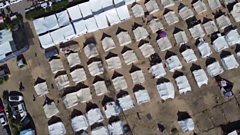
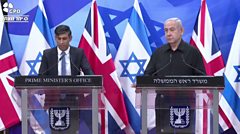
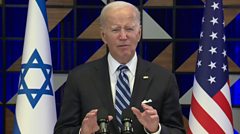

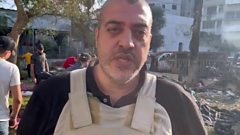
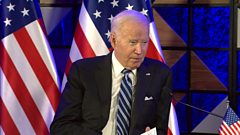

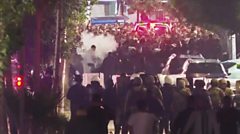

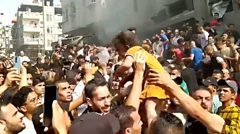
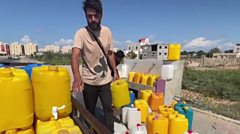




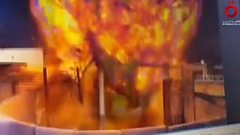
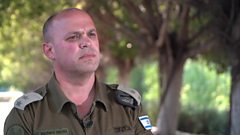
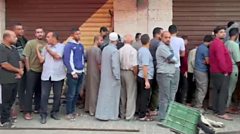

Live Reporting
Edited by Jessica Murphy
All times stated are UK
Get involved

.Copyright: . Video caption: Drone shows tents in Gaza for people who've been displacedDrone shows tents in Gaza for people who've been displaced 

AFP via Getty ImagesCopyright: AFP via Getty Images 
.Copyright: . 
BBCCopyright: BBC Dr Ghassan Abu-Sittah is working in GazaImage caption: Dr Ghassan Abu-Sittah is working in Gaza 
Ghassan Abu-SittahCopyright: Ghassan Abu-Sittah 
ReutersCopyright: Reuters 

Courtesy of Elinor ShaharCopyright: Courtesy of Elinor Shahar 
Getty ImagesCopyright: Getty Images 
.Copyright: . 
EPACopyright: EPA Trucks of a humanitarian aid convoy are parked outside the border gate between Egypt and Gaza, in Rafah, EgyptImage caption: Trucks of a humanitarian aid convoy are parked outside the border gate between Egypt and Gaza, in Rafah, Egypt 
.Copyright: . 
Getty ImagesCopyright: Getty Images Israel has cut off supplies of water, fuel, food and medicines to GazaImage caption: Israel has cut off supplies of water, fuel, food and medicines to Gaza 

ReutersCopyright: Reuters -
More than 100 trucks carrying vital supplies of food, water and medicines are waiting at the border between Egypt and Gaza
-
Yesterday the US brokered a deal to let 20 trucks enter, but it's not clear when this will happen
-
Aid workers have said this is nowhere near enough to help the more than a million displaced people
-
The UN chief has called for "rapid" access for aid to be distributed, with water, food, fuel and medical supplies running out
-
Israel has continued to bomb what it says are Hamas targets in Gaza
-
Its defence minister has told troops gathered near Gaza to "be ready", ahead of an expected ground offensive
-
Earlier, the UK PM met with his Israeli counterpart Benjamin Netanyahu, pledging the UK's support in a joint statement
-
Rishi Sunak has now arrived in Saudi Arabia for talks with Crown Prince Mohammed bin Salman, saying "we will work together to ensure regional stability"
-
British-Israeli man, Yonatan Rapoport, and also a grandmother and her 12-year-old granddaughter were confirmed killed by Hamas in the attacks on 7 October.
-
The
Palestinian ministry of health says six people have been killed in clashes
with the Israeli military in Nur Shams refugee in the occupied West Bank - the military says it used an aircraft to strike a "terrorist squad"

@RishiSunakCopyright: @RishiSunak
Latest PostContinue to follow our coverage
It’s now around 02:30 in Gaza and Israel, and we are standing by for a major speech by US President Joe Biden in about 30 minutes.
In the meantime, we are migrating our coverage to a new page.
Follow us here for all the latest updates.
Gazans can access about three litres of water a day
Water for basic needs in Gaza is running dangerously low, with no supplies being allowed in for over a week after Israel launched a "complete siege" following Hamas's 7 October attacks.
For anyone trying to get a sense of the scale of how much supplies have run dry, we've created this graphic to demonstrate it:
Drone footage shows shelters being used for those displaced
Hundreds of thousands of people have been displaced after the Israel-Gaza conflict started on 7 October.
Charities like UNRWA - the United Nations Relief and Works Agency - have been finding shelters for those who need it.
These tents are near the centre of the southern city of Khan Younis.
Video content
Risk of Israel-Hamas conflict spill over is 'real' - von der Leyen
European Commission President Ursula von der Leyen said the risk of regional spill over from the Israel and Hamas conflict is "real".
Speaking at the Hudson Institute in Washington, von der Leyen said dialogue between Israel and its neighbours must continue.
Moody's says Israel's credit rating 'under review'
Israel's credit rating is under review due to the military conflict with Hamas, according to global ratings agency Moody's.
A downgrade from Israel's A1 ratings could make it more difficult and expensive for the country to borrow money.
Moody’s says that the review has been “triggered by the unexpected and violent conflict between Israel and Hamas”.
"While a short-lived conflict could still have credit impact, the longer lasting and more severe the military conflict, the greater its impact is likely to be on policy effectiveness, public finances and the economy," Moody's said.
Moody's outlook for the nation had previously been stable.
The world is losing its humanity - UNRWA chief
Jeremy Bowen
International Editor
The Middle East is on the "edge of an abyss" as a result of the war between Israel and Hamas, UN agency chief Philippe Lazzarini has told the BBC.
The commissioner-general of UN relief agency UNRWA said violence could spill over across the region.
And he warned about the dire situation for civilians inside Gaza, calling again for humanitarian aid corridors into the territory.
Lazzarini said he fears "the world is now losing its humanity".
In an exclusive interview with the BBC, Lazzarini reiterated calls for humanitarian aid corridors, saying help "needs to be uninterrupted... predictable [and] meaningful" to help the people of Gaza.
Speaking in Jerusalem, the head of UNRWA condemned Hamas's attack on Israel, calling it a "horrific and barbaric massacre" that had created a "national trauma, a collective trauma in Israel".
Read more from the interview here
Hamas says several killed in blast near Gaza church
Several people have been killed and injured in a strike near a church in Gaza, Hamas says.
They had been sheltering at the Greek Orthodox church when it was hit, the interior ministry said.
This image showing the damage to the church has been verified by the BBC:
US ship shoots down missiles from Yemen, Pentagon says
A US Navy ship shot down missiles and drones from Yemen while patrolling in the Red Sea, the Pentagon said.
A Pentagon spokesperson said they could not confirm the missiles' intended target, but that they were headed "potentially toward targets in Israel".
"Our defensive response was one we would have taken for any similar threat in the region," he added.
Gaza surgeon using supermarket vinegar to treat infections
Throughout the Israel-Hamas war, we have been reporting about the extremely difficult conditions facing doctors and medical staff in Gaza.
We've heard several times from Dr Ghassan Abu Sittah, a plastic surgeon from north London who is working in Shifa Hospital in Gaza City.
He's told the BBC today he now using vinegar to treat some bacterial infections, because the solution that he had previously been using has run out.
Dr Abu Sittah added that they have also run out of the pins and the rods used to stabilise fractures in traumatic injuries.
Israel's preparations for possible ground invasion in Gaza
In recent days, Israel has signalled that its forces are poised to go into Gaza, with the aim of eliminating Hamas as a military force.
The scope of a potential ground assault or when it could happen is still unclear. Last week, Israel warned Palestinians living in northern Gaza to flee south, indicating an invasion was coming.
Israel's military has already massed its forces, tanks and artillery near the Gaza border. Some 300,000 reservists have been activated, alongside a standing force of more than 160,000.
Sending ground forces into Gaza is an operation fraught with risk and there are several factors that could derail it.
Read more about how an Israeli ground assault on Gaza would unfold here.
'My grandmother watched Hamas gunmen kill her husband, then she was kidnapped'
Nadia Ragozhina
Live reporter
"My grandmother was taken without her glasses, she was barefoot," 25-year-old Anat Moshe Shoshani tells me over the phone.
She sounds distressed as she recounts how her friend alerted her to the existence of a video on social media, showing her 72-year-old grandmother, Adina Moshe, sandwiched on a motorcycle between two Hamas gunmen in Gaza.
On 7 October, Shoshani's grandfather, David, was killed by Hamas gunmen in Kibbutz Nir Oz, about two miles from the Gaza border. The couple had been hiding in the shelter at their home, the house later set on fire by Hamas.
She learnt of her grandmother’s fate from social media.
"We are very worried," she tells me.
"We don't know if she can survive these kind of conditions. I can't understand what they are planning to do with the elderly and the children they kidnapped."
"We can't sleep, we can't eat."
She tells me that her grandmother takes medicine every day and had heart surgery three months ago.
"Every day becomes longer when she’s not here. She watched the terrorist murder her husband. She is very upset.
"We want her back as soon as possible."
US issues worldwide travel alert for American citizens
Matt Murphy
Live reporter, in Washington DC
As we reported earlier, the US state department has issued a rare worldwide caution to American citizens abroad, warning them of an increased risk of violent attacks.
US citizens were urged "to exercise increased caution" while travelling due to the potential for "terrorist attacks, demonstrations or violent actions against US citizens and interests". It comes amid increasing anger in the Middle East over US support for Israel's attacks on the Gaza strip.
Worldwide cautions are rare, and the state department last issued this kind of notice in August 2022 following the assassination of al-Qaeda leader Ayman al-Zawahiri in Kabul, Afghanistan.
Before that the previous notice was issued in 2017 - after President Donald Trump recognised Jerusalem as the capital of Israel - and in 2003 immediately following the invasion of Iraq. Thursday's notice advised all US citizens to "stay alert in locations frequented by tourists".
It's unclear what prompted the warning and whether the US has received a specific threat.
What is the Rafah crossing?
The Rafah border crossing is the southernmost post of exit from Gaza and borders Egypt's Sinai peninsula.
There are only two other border crossings from and into the Gaza Strip - Erez, a crossing for people with Israel in northern Gaza, and Kerem Shalom, a solely commercial goods junction with Israel in southern Gaza. Both are shut.
Rafah is now the only crossing point for humanitarian aid. Dozens of lorries carrying fuel and humanitarian goods are parked on the Egyptian side of the crossing, waiting for it to open.
Egyptian media is now saying the Rafah crossing will open for several hours on Friday.
Read more: What is the Rafah crossing and why is it Gaza's lifeline?
1,000 tonnes of food waiting at the border
"We have more than 1000 metric tonnes of food at the Egyptian border in Rafah," Aline Rumonge, the head of supply chains at the UN World Food Programme, has told the BBC.
She told BBC Radio's 4 PM programme it would take around 60 trucks to transport that amount of food and that it would be enough to feed just under half a million people for one week.
She explains that once the trucks pass the border, they will be ready to transport it to the shelters and other places were food is needed
"Once the food is inside Gaza, humanitarian organisations must be given full access to the people in need," she adds, saying they are waiting for the 20 trucks at the moment.
Egyptian state media say Rafah crossing to open on Friday
Egyptian state media say the Rafah Crossing into Gaza will be opened for several hours on Friday to allow the delivery of desperately needed aid.
More than 100 trucks carrying aid have been queuing for several days on the Egyptian side of the border, with the United Nations calling for urgent help for civilians in Gaza.
US wants ongoing aid for civilians in Gaza - state department
The US wants to see "sustained humanitarian assistance" going into Gaza and is "watching carefully" to see aid does not benefit Hamas", according to State Department spokesman, Matthew Miller.
As we've been reporting, US President Joe Biden yesterday said Israel and Egypt had agreed to allow 20 trucks of aid into the territory, but it remains unclear when this will happen.
The newly-appointed US envoy to the Middle East on humanitarian issues, David Satterfield, met Israeli and Egyptian officials today to "negotiate the exact modalities" for implementing the agreement, Miller said.
The statement said that details for humanitarian aid to go in to Gaza would be issued "over the coming days".
Adding whether it was limited to the 20 trucks - which aid agencies have said is a small fraction of what's needed - he said the US's goal is "ongoing assistance to innocent civilians".
But he said Israel is concerned that aid will be diverted by Hamas for its own use, and the US shares those concerns.
"We're going to be watching very carefully how it's delivered," he said.
The crucial role of Saudi Arabia
Sameer Hashmi
Middle East correspondent
The UK PM Rishi Sunak's meeting with Saudi Arabia's Crown Prince Mohammed Bin Salman is significant.
Saudi Arabia is a vital player when it comes to engaging with all international and regional parties to halt the ongoing escalation and prevent its further spread in the region
Until a couple of weeks ago, Riyadh was involved in three-way negotiations with Tel Aviv and the White House to normalise relations between Saudi Arabia and Israel. The talks were moving at a swift pace but all that changed on October 7 after Hamas's attack.
Since then Saudi Arabia has not only come out in strong support of the Palestinians but has also condemned and blamed Israel for the war.
For the crown prince, it's imperative to continue the long-held position of Saudi monarchs to support Palestinians as anger has been growing in Muslim countries due to Israel's relentless bombing in Gaza.
The Palestinian issue has united the otherwise divided Muslim world. The first phone call between the crown prince and the Iranian president since the two countries normalised relations in March took place in the aftermath of the new fighting between Hamas and Israel. Given the volatile dynamics of the region, the crown prince could play an important role.
Sunak encourages MBS to 'support stability in region'
UK PM Rishi Sunak and Saudi Arabia's Crown Prince Mohammed bin Salman agreed the "loss of innocent lives in Israel and Gaza over the last two weeks has been horrific" in their meeting, the PM's spokesman has said.
Sunak, who touched down in Riyadh earlier, encouraged Saudi Arabia to use its influence to "support stability" in the Middle East, according to a statement by the PM's spokesman.
Sunak and bin Salman "underscored the need to avoid any further escalation" and for co-ordinated action to achieve this aim.
"The prime minister and crown prince agreed on the pressing need for humanitarian access into Gaza to provide vital water, food and medicine", the statement added.
What's been happening?
Just joining us or need a recap? Here's a round-up of the key developments today:
In and around Gaza:
Sunak's diplomatic trip:
Hamas attack on Israel:
Violence in the West Bank:
We will work together to prevent a dangerous escalation - Sunak
UK Prime Minister Rishi Sunak is in Saudi Arabia and he's shared this picture of his arrival on social media.
"As an international community, we must not allow Hamas's terror attack to become a catalyst for a terrible humanitarian crisis in Gaza", the PM said on X, formerly Twitter.
"We will work together to ensure regional stability and prevent a dangerous escalation", he added.
We'll bring you more from his visit as we get it.